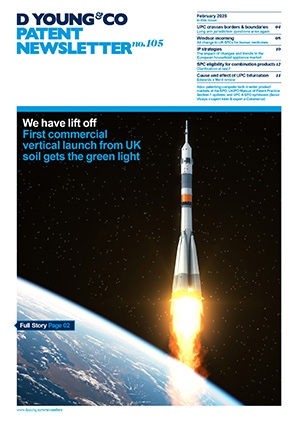Countdown to the UPC: as launch preparations begin we answer your opt-out questions
Following news on the 18 January 2022 that Austria has deposited the instrument of ratification for the Protocol to the Agreement of a Unified Patent Court, the UPC Preparatory Committee has announced the commencement of the UPC Provisional Application Period (PAP). The UPC provisional application period allows for completion of preparatory work establishing the UPC, including stress testing of the electronic case management system and the appointment of judges. The provisional application period is expected to last eight months, although this may be extended if more time is needed to complete the preparatory work.
UP & UPC guides
We have an area on our website dedicated to the UP and the UPC which includes our detailed guides and webinars concerning the UP & UPC.
Read moreWith the provisional application period in effect, Germany can deposit its ratification of the UPC Agreement. Once German ratification is deposited, the new court will commence on the first day of the fourth month after the month in which that deposit occurs. Germany will not trigger this timetable until all preparatory work is complete. Consequently, the UPC and UP system could come into force between mid 2022 and early 2023.
Sunrise period
Ratification by Germany will also determine the beginning of the “sunrise period” – a three-month window before the UPC becomes fully operational when patent owners are able to file “opt-outs” for existing European patents and associated SPCs in one or more countries taking part in the UPC, and pending European applications. The list of countries is available here: http://dycip.com/upc-countries.
Opting out in the sunrise period is important for patent owners wanting to avoid the jurisdiction of the UPC. In this article we have summarised the UPC opt-out frequently asked questions (FAQ).
What is the opt-out?
The opt-out is a means by which a patent owner can remove European patents and European patent applications from the jurisdiction of the Unified Patent Court (UPC) when it comes into effect. The default position is that all European patent applications and European patents will be subject to the jurisdiction of the UPC when it comes into effect, unless an opt-out is filed. The opt-out ensures that the litigation options remain the same.
The opt-out is related to the UPC. It is not relevant for unitary patents. Unitary patents (UPs) are always subject to the jurisdiction of the UPC and cannot be opted out.
What happens if I don’t file an opt-out?
The UPC will share jurisdiction over your European patent and associated SPC(s) with the national courts. In practice this means that enforcement or third party actions can take place in the UPC or one or more national courts.
When can an opt-out be filed?
The opt-out will be available from the beginning of the “sunrise period” to the end of the “transitional period”, provided that there is no ongoing UPC litigation when the opt-out is filed.
The sunrise period does not yet have a start date but it is expected to begin at least three months before the UPC comes into effect. If, for example, the UPC begins on 01 October 2022, then the sunrise period and opt-outs could have a start date of 01 July 2022.
The transitional period will expire at least seven years after the UPC comes into effect. It may, however, be extended by a further seven years. Continuing the above example, the transitional period could therefore expire on 01 October 2029 or 01 October 2036. An opt-out timeline with example dates is shown below.

So the opt-out depends on the beginning of the UPC; when will that be?
The UPC will come into effect once Germany deposits its ratification of the UPC Agreement. Specifically, the UPC will come into effect on the first day of the fourth month after Germany deposits its instrument of ratification. Germany is therefore the “gatekeeper” to the UPC and UP and are expected to deposit their ratification in mid to late 2022 depending on whether the necessary preparation for the UPC and UP has been completed.
How long will the opt-out be effective?
It is understood that the opt-out, once registered by the UPC Registry, will be effective for the lifetime of the European patent/patent application. An exception to this will be if the patent owner subsequently withdraws the opt-out.
So I can change my mind about the opt-out?
Yes – if you file an opt-out and later change your mind, then you can withdraw the opt-out in order to restore the shared jurisdiction of the UPC and national courts. This option is, however, only available once. Withdrawal of the opt-out is permanent, it is not possible to file a second opt-out. A withdrawal is also not available if an action has been launched in the national courts.
How can I request the opt-out?
Opt-out applications will be submitted to the UPC registry via an online management system. There will be no official fee.
Only the proprietor(s) or applicant(s) is entitled to opt-out and the European representative submitting the opt-out application will be required to complete a declaration stating that they are entitled to act on behalf of the proprietor(s)/applicant(s). The current proprietor(s)/applicant(s) might not be the owner(s) registered before the EPO or national patent office(s) meaning that the preparation of a valid declaration is likely to be key for acceptance and validity of any opt-out application.
Can co-owners, licensees or SPC owners request the opt-out?
Licensees will not be able to request an opt-out. If you are a licensee, exclusive or otherwise, and have a preference for the opt-out, this should therefore be discussed with the patent owner. Licence agreements should also be reviewed for handling of the opt-out.
Co-owners must opt-out in agreement. It is not possible to divide a bundle of national rights from a granted European patent if they are owned by different entities, for example, opting out certain members of the bundle.
A supplementary protection certificate (SPC) must “follow” the EP patent on which it is based. This means that if the European patent is opted out, the SPC must also be opted out. If the SPC and patent are owned by different entities, then all owners must opt out in agreement.
Why should I consider the opt-out?
There are, unsurprisingly, many advantages and disadvantages to the new system and the opt-out decision is likely to need a case-by-case analysis balancing a range of factors.
One of the key factors is the risk of central revocation in an untested environment. Many patent owners may therefore opt out everything – at least in the initial few years of the system coming into effect. Should central action in the UPC be desired in future, the opt-out could then be withdrawn and suitable action taken, provided that no action has been launched in the national courts. However, the risk of opting everything out is that competitors will be able to initiate national litigation and “lock” patents out that may have been suited to UPC enforcement. Opting everything out will also mean that there is limited opportunity for UPC case law to be influenced.
Another factor to consider is the shared jurisdiction between the UPC and national courts for non opted-out EP patents. This shared jurisdiction allows the proprietor to choose where to bring an action; assuming of course that proceedings have not already been started in the UPC.
One option to consider is therefore the use of divisional applications and/or related cases to balance the advantages and disadvantages of the new system. Another option is to have co-existing national and European patents (provided double patenting provisions are complied with).
What about the UK?
The UK has withdrawn its ratification of the UPC Agreement and its involvement in the UPC and UP. This means that nothing changes for EP patents validated in the UK (the UK part of the European patent “bundle”). The UK courts continue to have jurisdiction for any enforcement or third party action. UK-based European patent attorneys will, however, be able to represent clients in the UPC, file opt-out applications and provide advice on the new system.
Representation
A unitary patent (UP) is obtained by filing a European patent application and selecting the UP at grant. Both our UK and Germany based European Patent Attorneys will be able to obtain UPs at the European Patent Office, exactly as we currently do for European patents. We will also be able to prepare and file opt-outs.
Furthermore, D Young & Co’s experienced European patent attorneys, UK and German qualified patent attorneys as well as solicitors and Rechtsanwälte have the rights of representation before the UKIPO, the DPMA, the EPO and the UPC and can advise and support you when enforcing or defending actions for patent infringement and revocation/nullity actions. We will therefore be able to advise on a strategy for choosing the most appropriate route for patent protection utilising both the options of the unitary patent and national patent rights to match budget with respect to our client’s business strategy.
UP & UPC on demand webinars
Our new library of UP & UPC webinars, including our webinar guide to the UPC opt-out is now online:
Read more

